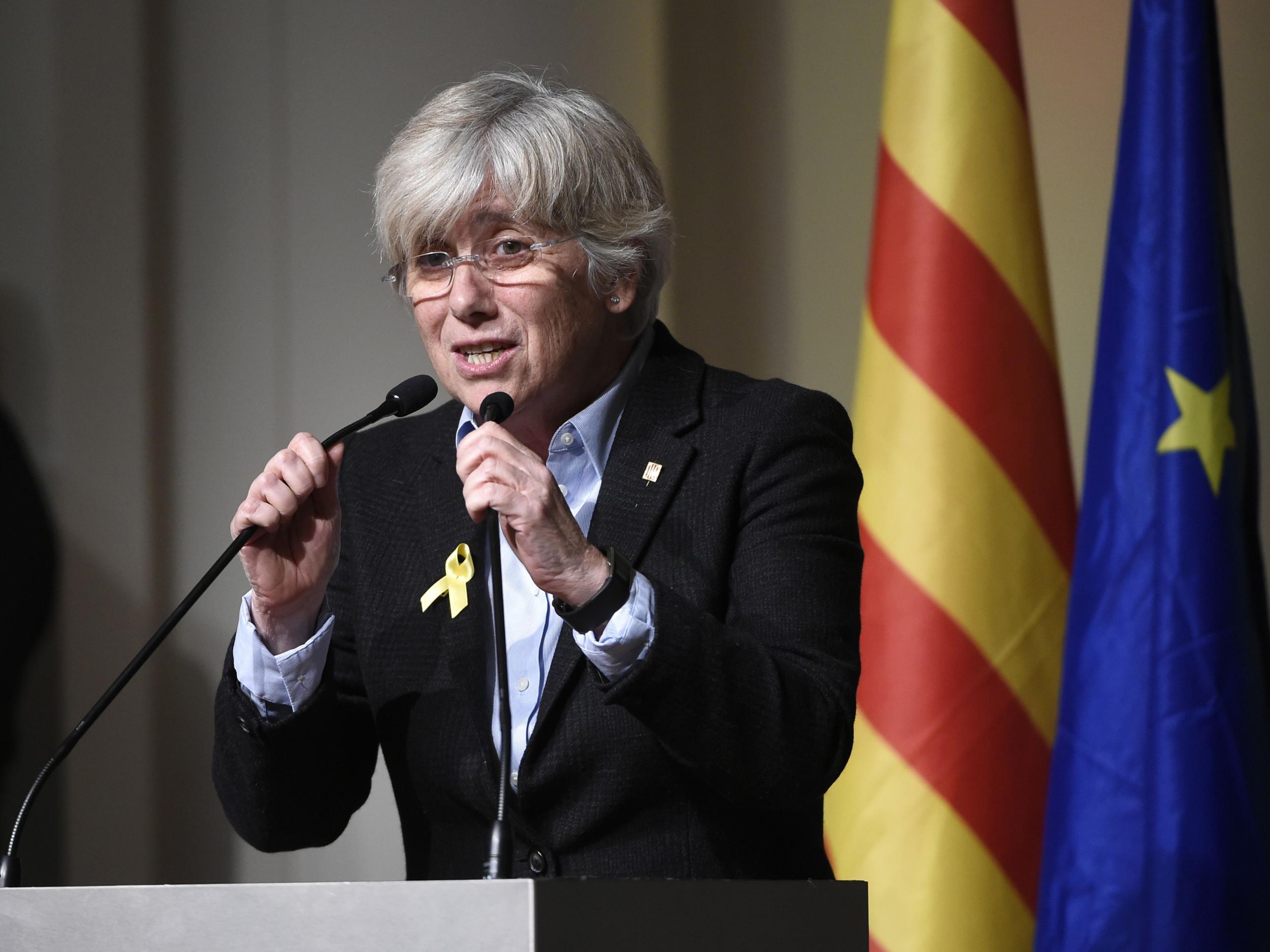Exiled Catalan minister criticises Europe's silence over separatist prisoners
Clara Ponsati claims pro-independence politicians held as 'hostages' by Madrid to 'blackmail' movement into submission

Your support helps us to tell the story
From reproductive rights to climate change to Big Tech, The Independent is on the ground when the story is developing. Whether it's investigating the financials of Elon Musk's pro-Trump PAC or producing our latest documentary, 'The A Word', which shines a light on the American women fighting for reproductive rights, we know how important it is to parse out the facts from the messaging.
At such a critical moment in US history, we need reporters on the ground. Your donation allows us to keep sending journalists to speak to both sides of the story.
The Independent is trusted by Americans across the entire political spectrum. And unlike many other quality news outlets, we choose not to lock Americans out of our reporting and analysis with paywalls. We believe quality journalism should be available to everyone, paid for by those who can afford it.
Your support makes all the difference.A Catalan separatist fugitive living in Scotland after fleeing rebellion charges in Spain has criticised European leaders’ silence over the imprisonment of the region’s pro-independence politicians.
Clara Ponsati, an ex-minister in the Catalan government, claimed her former colleagues were being used as “hostages” by Madrid to “blackmail” the movement ”into surrender”.
She escaped into Belgium with former Catalan president Carles Puigdemont and three other ministers in October, days after a failed bid for succession. They all face arrest if they return to Spain.
Catalonia has been without a government and under direct Spanish rule for five months, with key pro-independence leaders either in self-imposed exile or in prison awaiting trials following an independence referendum considered by Madrid to be illegal.
Speaking to The Independent, Ms Ponsati said: “I don’t see the situation improving if there is not more respect for what Catalans have decided with their vote. As long as we are under the threat of having hostages being used to blackmail political decisions, it is going to be very difficult to move on.”
The former education minister arrived in Scotland this month to resume work at the University of St Andrews, where she ran the School of Economics and Finance before leaving for politics in July.
She remains wanted in Spain on rebellion and sedition charges, as does Mr Puidgemont and the other ministers in exile. The former crime alone carries a jail sentence of up to 30 years.
Four other separatist leaders are being held in Spanish prisons on the same charges. They include Jordi Sanchez, pro-independence parties’ nominated candidate for the Catalan presidency, who judges last week refused to free on bail to attend a regional parliamentary vote on his appointment.
Mr Puidgemont, who has been forced to abandoned an attempt to return as president and instead throw his weight behind Mr Sanchez, has accused the Madrid of “criminalising” the independence movement. In a submission to the UN human rights committee, the ousted leader's lawyers say his right to a political life and Catalans' right to elect their government have been violated.
Ms Ponsati said: “The Spanish government is dictating what candidates are acceptable, judges are deciding whether they can allow people to stand or not; all that is very much a non-sovereign parliament.
“There are four persons in prison, in preventive prison with no bail, on crimes that are imaginary, by a court that is not competent. Really it is a very major abuse of the rule of law.”
Ms Ponsati said she was disappointed but unsurprised that European governments, including the UK, had remained silent over prosecutions and detentions that Amnesty International has described as “excessive”.
British Foreign Secretary Boris Johnson has previously rejected calls for an intervention, while EU leaders gave a muted response to Spanish authorities’ brutal crackdown on referendum voters.
“The Catalonian referendum is a matter for the Spanish government and people,” said Mr Johnson in October. “Spain is a close ally and a good friend, whose strength and unity matters to the UK.”
Ms Ponsati said: “States protect each other and the status quo is always at an advantage.
“However, the fact I’m not surprised that they prefer to look the other away doesn’t mean that I find it decent or acceptable that democratic governments are not being a bit more vocal and more critical of the Spanish authorities’ abuse.
“What they have been doing is totally against the European charter of human rights.”
However, Ms Ponsati said had faith Britain would not extradite her despite Spain’s judicial authorities saying this week they could reissue European arrest warrants, withdrawn in December, for the five Catalan fugitives.
Ms Ponsati said: “I don’t think there would be grounds for extradition; that would be a politically motivated European order of arrest, and that’s not within the rules. I trust an independent judge would not comply with that.
“I am confident British justice works, unlike Spain.”
Madrid has defended the detention of Catalan leaders and rejected their depiction as political prisoners. The Spanish government’s delegate in Catalonia, Enric Millo, said: “Nobody is in prison for their opinions. Someone can be in prison for their actions, not for their opinions.”
As well as Mr Sanchez, ousted Catalan vice-president Oriol Junqueras, former interior minister Joaquim Forn, and grassroots separatist leader Jordi Cuixart remain behind bars.
Supreme Court judges have refused them bail because they say there is a risk they would reoffend.
Join our commenting forum
Join thought-provoking conversations, follow other Independent readers and see their replies
Comments